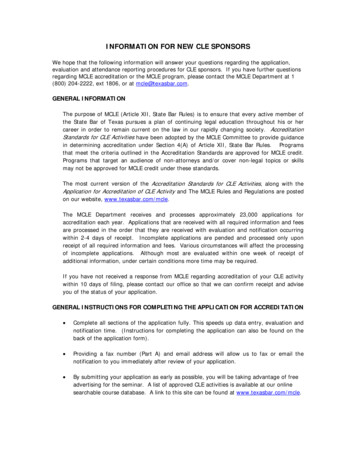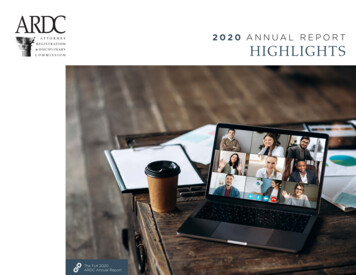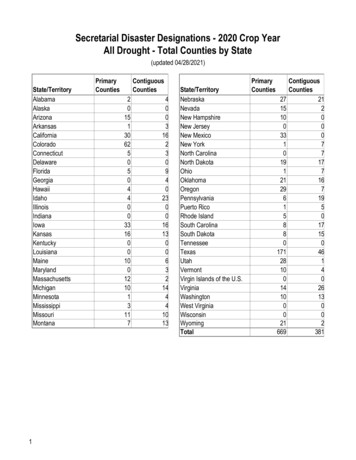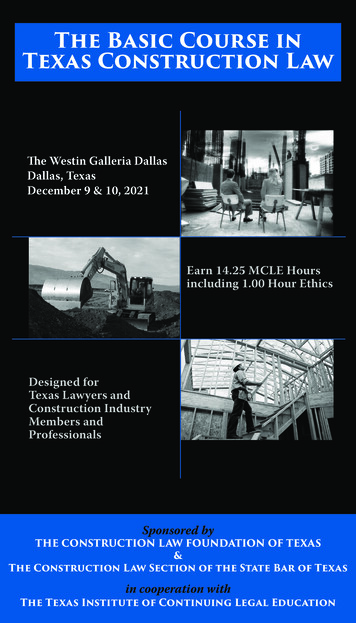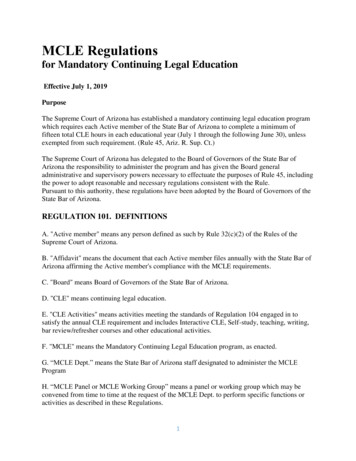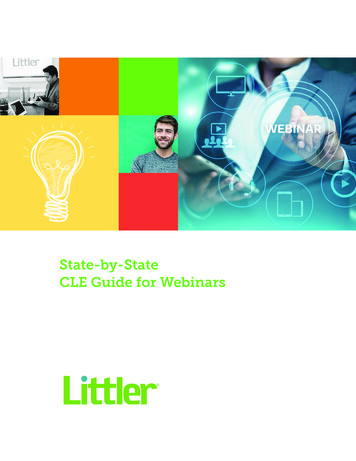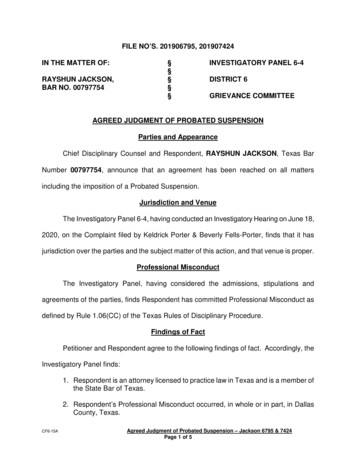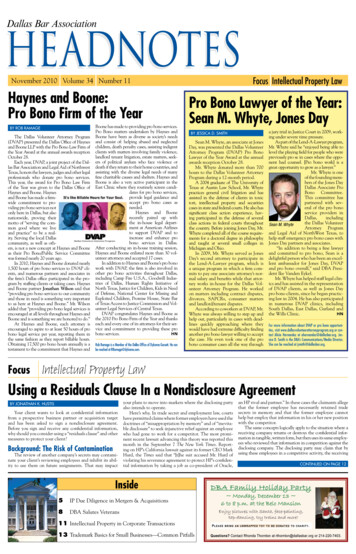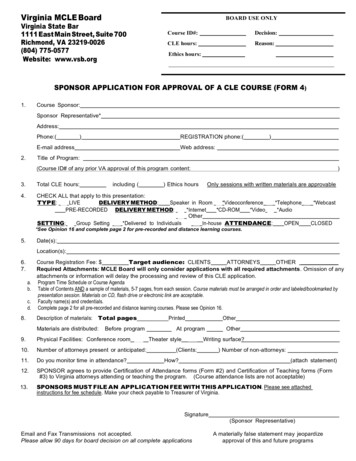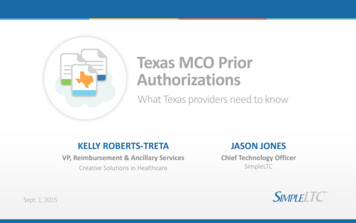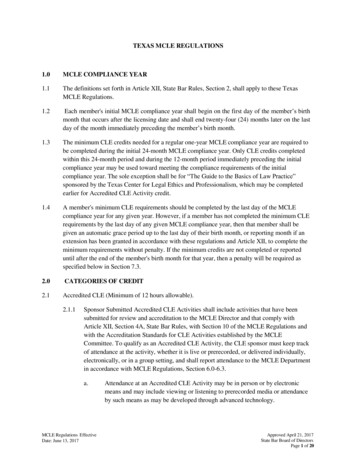
Transcription
TEXAS MCLE REGULATIONS1.0MCLE COMPLIANCE YEAR1.1The definitions set forth in Article XII, State Bar Rules, Section 2, shall apply to these TexasMCLE Regulations.1.2Each member's initial MCLE compliance year shall begin on the first day of the member’s birthmonth that occurs after the licensing date and shall end twenty-four (24) months later on the lastday of the month immediately preceding the member’s birth month.1.3The minimum CLE credits needed for a regular one-year MCLE compliance year are required tobe completed during the initial 24-month MCLE compliance year. Only CLE credits completedwithin this 24-month period and during the 12-month period immediately preceding the initialcompliance year may be used toward meeting the compliance requirements of the initialcompliance year. The sole exception shall be for “The Guide to the Basics of Law Practice”sponsored by the Texas Center for Legal Ethics and Professionalism, which may be completedearlier for Accredited CLE Activity credit.1.4A member's minimum CLE requirements should be completed by the last day of the MCLEcompliance year for any given year. However, if a member has not completed the minimum CLErequirements by the last day of any given MCLE compliance year, then that member shall begiven an automatic grace period up to the last day of their birth month, or reporting month if anextension has been granted in accordance with these regulations and Article XII, to complete theminimum requirements without penalty. If the minimum credits are not completed or reporteduntil after the end of the member's birth month for that year, then a penalty will be required asspecified below in Section 7.3.2.0CATEGORIES OF CREDIT2.1Accredited CLE (Minimum of 12 hours allowable).2.1.1Sponsor Submitted Accredited CLE Activities shall include activities that have beensubmitted for review and accreditation to the MCLE Director and that comply withArticle XII, Section 4A, State Bar Rules, with Section 10 of the MCLE Regulations andwith the Accreditation Standards for CLE Activities established by the MCLECommittee. To qualify as an Accredited CLE Activity, the CLE sponsor must keep trackof attendance at the activity, whether it is live or prerecorded, or delivered individually,electronically, or in a group setting, and shall report attendance to the MCLE Departmentin accordance with MCLE Regulations, Section 6.0-6.3.a.MCLE Regulations EffectiveDate: June 13, 2017Attendance at an Accredited CLE Activity may be in person or by electronicmeans and may include viewing or listening to prerecorded media or attendanceby such means as may be developed through advanced technology.Approved April 21, 2017State Bar Board of DirectorsPage 1 of 20
2.1.2b.A Mentor Program is an Accredited CLE Activity that is either sponsored orcosponsored by the State Bar of Texas or otherwise approved by the MCLECommittee, is open to all members of the State Bar, and is completed inconjunction with MCLE approved training. The purpose of the approvedtraining/mentoring relationship shall be the preparation of participants forproviding pro-bono services or for managing professional responsibilitychallenges and shall consist of substantive legal training as opposed to coachingor personal encouragement. A maximum of five (5) hours, including one (1)ethics hour, per compliance year may be claimed for the actual amount of timespent in the mentoring relationship. Mentor programs shall be submitted to theMCLE department in accordance with Section 10.2 and 10.8.c.While high quality written materials should be included with Accredited CLEActivities, written materials alone shall not qualify as an Accredited CLEActivity.d.Accredited CLE Activities shall be delivered or presented in one or more of theapproved format(s) outlined in the Accreditation Standards for CLE Activities.The Committee may approve other methodologies for delivery of AccreditedCLE as developed through advanced technology.Attorney Submitted Accredited CLE Activities shall include:a.speaking at Accredited CLE Activities, including preparation time andpresentation time with additional preparation credit for repeated presentations(Article XII, Section 4C);b.writing, as an author or co-author, materials published in the form of an article,chapter or book which contributed substantially to the continuing legal educationof the author or co-author and other attorneys and which was not done in theordinary course of the practice of law, the performance of regular employment oras a service to clients (Article XII, Section 4D);c.teaching, lecturing or speaking in the position of a part-time faculty in any lawschool which is approved by the American Bar Association, except as to theminimum requirements for CLE in legal ethics and professional responsibility(Article XII, Section 4F);d.attending in person (through non-electronic means) instruction at an ABAaccredited law school after admission to practice. Credit shall be for the actualhours of in-class instruction and shall not exceed thirty (30) hours per complianceyear. (Article XII, Section 4J); A transcript verifying completion of the course(s)and a non-refundable 25 accreditation fee (per semester) is required for eachapplication for law school credit.MCLE Regulations EffectiveDate: June 13, 2017Approved April 21, 2017State Bar Board of DirectorsPage 2 of 20
2.1.3Non-qualifying Activities.An activity that is done in the ordinary course of the practice of law, the performance ofregular employment, or as a volunteer service to clients, government entities, barorganizations or the general public shall not receive Accredited CLE Activity credit. Anactivity associated with membership or attendance at committee meetings, businessmeetings or work sessions shall not receive Accredited CLE Activity credit.2.2Self-Study Credit.Self-Study Credit is CLE credit that is obtained from any type of CLE activity that is performedby an individual attorney acting alone or while attending non-accredited professional educationalactivities. A maximum of three (3) Self-Study credit hours can be applied toward each MCLEcompliance year. Self-Study Credits may be claimed for any of the following types of CLEactivities:a.reading materials specifically prepared for an accredited activity;b.reading substantive legal articles in recognized legal publications;c.reading digests, advance sheets, cases, treatises, statutes, and regulations;d.viewing non-accredited videotapes or digital media produced for legal educationpurposes;e.listening to non-accredited audiotapes or digital media produced for legal educationpurposes;f.attending professional educational activities that train participants in the use of non-legalsoftware or teach non-legal skills such as stress management, time management, personalrelational management, career management, rainmaking, marketing, accounting, generaloffice management, and communication skills.g.attending professional educational activities that present business, technical or scientificknowledge including programs dealing with business management concerns, medical orengineering knowledge and concepts, or other educational activities dealing with topicsrelevant to specific areas of law practice;h.serving as a judge or evaluator in any type of mock trial, moot court or client counselingcompetition, class or program; andi.speaking or writing, including presentation, preparation and composition time for any ofthe self-study activities enumerated above (a-h).MCLE Regulations EffectiveDate: June 13, 2017Approved April 21, 2017State Bar Board of DirectorsPage 3 of 20
3.0MINIMUM EDUCATIONAL REQUIREMENTS3.1Fifteen total hours of continuing legal education credit are required to be completed during eachMCLE compliance year (including the initial 24-month compliance year) in order to meet theminimum educational requirements set out in Article XII, Section 6A, State Bar Rules. Aminimum of twelve (12) credit hours must be completed in the form of Accredited CLEActivities, defined by Section 2.1.1-2.1.2.3.2A minimum of three (3) of the required fifteen (15) hours of CLE must be completed in thesubject areas of legal ethics and/or professional responsibility. Two (2) hours of this minimum 3hour requirement must be completed in the form of an Accredited CLE Activity. One (1) of thisminimum 3-hour requirement may be completed in the form of self-study credit. (Article XII,Section 6B)3.3Carry-forward CLE Credit Hours. A member may carry forward CLE credit hours earned inexcess of the minimum 15-hour requirement to the following year's requirement up to amaximum limit of fifteen (15) credit hours. Members may only carry forward excess creditearned to the next MCLE compliance year. Legal ethics or professional responsibility credit willcarry forward similarly. (Article XII, Section 6E)3.4CLE credit hours are computed based on actual time spent in an activity (actual instruction time,reading time, running time of tapes, audio, video or digital media) reported in hours to the nearestone-quarter hour and reported in decimals (Article XII, Section 7A and 7B). Sponsors shallcompute CLE credit hours for accredited activities based on this formula and shall identify thenumber of hours on the application form prescribed by the MCLE Committee. (Article XII,Section 7A)The individual attorney will need to compute CLE credit hours in instances of self-studyprograms, preparation and presentation time for speakers, composition time for authors as well asinstances where the attorney attends part of a session of a planned activity. (Article XII, Section7B and 7C)4.0CONTINUING LEGAL EDUCATION ACTIVITIES SOURCES4.1Accredited CLE meets the criteria of Section 2.1, Section 10 and the Accreditation Standards forCLE Activities and may include live or prerecorded presentations. Non-accredited CLE used onan individual basis shall be considered Self-Study credit. (Article XII, Section 4B)4.2In-house Educational Activities applicable to Self-Study credit shall include those non-accreditedactivities that are offered by law firms or corporations that are solely for the benefit of their ownemployees. (Article XII, Section 4B)4.3Accredited In-house CLE shall include those activities that are offered by local, state and federalgovernment agencies, the military, and law firms or corporations, provided each program isaccredited in advance, in accordance with Section 2.1.1, and is a structured continuing legaleducation activity.MCLE Regulations EffectiveDate: June 13, 2017Approved April 21, 2017State Bar Board of DirectorsPage 4 of 20
5.0SPECIAL CASES AND EXEMPTIONSAn exemption or special case status shall apply to the entire MCLE compliance year (first day ofthe birth month through the last day of the month immediately preceding the birth month). Anychange in status during the compliance year shall be promptly reported to the MCLE Director onthe appropriate reporting form.5.1Full-time Faculty Members of ABA accredited law schools may be granted course credit equalto the minimum requirements of Article XII, except for the minimum requirement for CLE inlegal ethics or professional responsibility as specified in Section 3.2 above.5.1.1 Part-time Faculty Members of ABA accredited law schools may claim special coursecredit for the actual hours of class instruction time, not to exceed 12 hours percompliance year, such credit not to count towards requirements for CLE in legalethics and professional responsibility.5.1.2 Full-time and Part-time Faculty Members shall provide to the MCLE Departmenthis/her assertion of full-time or part-time teaching status at the law school of whichhe or she is a faculty member. Annually, the member will be required to completethree (3) hours of legal ethics (Article XII, Section 4F) and report this credit asoutlined below in Section 6.5.5.2Judicial Exemption.Judges subject to Supreme Court Order for Judicial Education dated August 21, 1985, SupremeCourt Order for Judicial Education for Retired or Former District Judges dated July 2, 1986, andfederal judicial officers are eligible to claim an exemption from these requirements5.2.15.3Judges exempt from the Rules are requested to give written notification to the MCLEDirector in order to claim this exemption.Non-practicing Exemption.5.3.1Members who have not engaged in the practice of law in Texas during the entirety of anMCLE compliance year are eligible to claim an exemption from the MCLE requirements.Members who are engaged in the practice of law at the beginning of a MCLE complianceyear but who later cease from practice during that compliance year are not eligible forthis non-practicing exemption.5.3.2For purposes of this section, 'practice of law' shall mean: (1) the preparation of any kindof pleading or other paper incident to actions and special proceedings on behalf of aclient before judges, courts and administrative agencies, (2) the preparation orpresentation of any kind of legal instrument, and (3) in general, the giving of advice toclients and taking any form of action for them in matters connected with the law. All ofthese enumerated services shall be considered practicing law regardless of whether a feeis charged or collected. However, a member who renders any of these enumeratedservices on behalf of his/her own personal or immediate family interests shall not beconsidered to be practicing law for purposes of this definition.MCLE Regulations EffectiveDate: June 13, 2017Approved April 21, 2017State Bar Board of DirectorsPage 5 of 20
5.3.35.4Members who serve as judicial law clerks in Texas, including federal judicial law clerks,are not eligible for this non-practicing exemption.A member who is on Inactive membership status with the State Bar during the entire MCLEcompliance year shall be exempt from the MCLE requirements. Members whose membershipstatus is Active at the beginning of a MCLE compliance year but who later change to Inactivestatus during the course of that compliance year are not eligible for this exemption.5.4.1For members who change to Inactive membership status during the course of thecompliance, the MCLE Department may automatically defer completion of anyremaining MCLE requirements (including payment of penalties for late filing) for thatcompliance year. Upon activation of membership status, members shall be given ninety(90) days to complete and report all deferred MCLE requirements. Failure to completedeferred requirements during this 90-day period, will subject the member to suspensionin accordance with Article XII.5.5A member who has been disbarred, who has no permanent license or who has resigned frommembership in the State Bar shall be exempt from the MCLE requirements.5.6Legislature/Congress.Any member who is either (a) a member of the Texas Legislature during any MCLE complianceyear, or (b) a member of the U.S. Congress during any MCLE compliance year is eligible to beautomatically credited with the minimum number of CLE credits required by the MCLE Rules.5.7Legislature Attorney.Any member who is employed as an attorney in one of the capacities specified in Section 81.113of the Texas Government Code (as amended) for the Texas Legislature, is eligible to beautomatically credited with the minimum number of CLE credits required by the MCLE Rules,except for the minimum requirements in legal ethics or professional responsibility as specified inSection 3.2 above.5.8Hardship Exemption.Any member who is unable to satisfy the minimum CLE requirements during any MCLEcompliance year as a result of undue hardship caused by illness, medical disability or otherextraordinary or extenuating circumstances beyond the control of the member may apply for ahardship exemption from the MCLE requirements for that compliance year. Undue hardshipgenerally will not include financial hardship or lack of time due to a busy professional or personalschedule.5.9Age Exemption. (Repealed)Any member who is 70 year of age or older, shall be exempt from MCLE requirements. Memberswho are 69 years of age during the compliance year and who turn 70 years of age at the end of thecompliance year will be required to comply with MCLE requirements. The age exemption isMCLE Regulations EffectiveDate: June 13, 2017Approved April 21, 2017State Bar Board of DirectorsPage 6 of 20
repealed effective June 1, 2015, with an implementation date of June 1, 2016. Members who are70 years or older on or after June 1, 2016 will begin their compliance year on the first day of theirbirth month.5.10Self-study Allowance.Any member who is unable to satisfy the minimum CLE requirements during any MCLEcompliance year due to extraordinary or extenuating circumstances beyond the control of themember may apply to have the maximum limit on self-study credit hours specified in Section 2.2above waived, such that all of the remaining CLE credit hours for that compliance year can becompleted through self-study credit.5.11Extensions.A member may file a written petition requesting an extension of the member's MCLE complianceyear for a maximum of ninety (90) days past the last day of the member's birth month whencircumstances exist that prevent the member from being able to comply with the MCLErequirements for the compliance year. "Good Cause" for an extension may exist in the event ofillness, medical disability or other extraordinary hardship or extenuating circumstances beyondthe control of the member. An extension generally will not be allowed due to financial hardship orlack of time due to a busy professional or personal schedule.5.11.1 A member seeking an extension shall submit a written request to the MCLE Departmentdetailing the circumstances for such request. If an extension is granted, relatedcompliance fees incurred may be waived. CLE hours completed during the extensionperiod and used toward meeting requirements for the immediately preceding complianceyear, may not be used again toward the next compliance year’s requirements. Hours thatare completed in excess of the 15-hour minimum requirement shall carry-forward asoutlined in Section 3.3. The member shall be promptly notified of the MCLEDepartment’s decision.6.0PROCEDURES FOR REPORTING CLE CREDIT HOURS6.1Attendance Records for Accredited CLE Activities. CLE sponsors are required to timely submitTexas member attendance records to the MCLE Director for each accredited CLE activity. CLEsponsors are not responsible for meeting individual attorney reporting deadlines.6.2CLE attendance information shall be submitted to the MCLE Director by the CLE sponsor via 1)State Bar of Texas CLE Attendance Form, 2) approved Internet attendance submission, 3)approved electronic attendance file submission, or 4) any other attendance submission formatdeveloped through advanced technology, subject to approval of the MCLE Committee.6.36.2.1Attendance that is submitted via State Bar of Texas CLE Attendance Form shall besubject to a 2.00 per attendee service charge for processing.6.2.2Attendance that is submitted via electronic file submission or by approved Internetsubmission shall not be subject to a service charge.The MCLE Director shall not accept CLE attendance certificates or attendance lists submitted inMCLE Regulations EffectiveDate: June 13, 2017Approved April 21, 2017State Bar Board of DirectorsPage 7 of 20
formats that are not specified by Section 6.2 unless a 10 per attendee service chargeaccompanies the certificate(s) or list(s).6.4Reporting Attendance to CLE Sponsors by Members6.4.1Each member shall report his or her attendance to the CLE sponsor by one of thefollowing approved methods:a)by completing a State Bar of Texas CLE Attendance Form while in attendance atan accredited CLE activity. The State Bar of Texas Attendance Form should beprovided by the CLE sponsor of an MCLE accredited activity. The member mustcomplete the attendance form while in attendance and leave the completed formwith the sponsor for submission to the State Bar for inclusion in the member'sMCLE compliance record; orb)by signing an electronic transfer attendance list or roster that will be used by theCLE sponsor to report credits directly to the MCLE Director via the Internet,electronic file transfer, or other transfer format developed through advancedtechnology, subject to approval of the MCLE Committee.6.4.2If a member is unable to complete a State Bar of Texas CLE Attendance Form or sign anelectronic transfer attendance list while in attendance at an accredited CLE activity, themember shall report CLE credits to the MCLE Director via either 1) the State Bar ofTexas MCLE Internet reporting site or 2) completion and submission of a CLE CreditInput Form to be obtained from the MCLE Department.6.4.3The MCLE Director shall not accept CLE attendance certificates or attendance listssubmitted by individual members, or attendance information reported in formats that arenot specified by Section 6.4.2, unless a 10 per course service charge accompanies thecertificate(s) or list(s).6.4.4A member who by-passes reporting to the CLE sponsor, either intentionally orunintentionally, and reports attendance directly to the MCLE Director, automaticallyconsents to the release of his or her name to the sponsoring organization for the solepurpose of reconciling attendance records. (Article XII, Section 12).6.5Members are responsible for timely reporting of all other types of CLE credit hours for recordingon their MCLE compliance record via one of the approved member reporting formats outlined in6.4.2 above.6.6A member who completes CLE hours during the birth month, non-compliance period (Section 7below), or reporting month if an extension has been granted, to meet requirements for theimmediately preceding compliance year, is responsible for timely reporting these credits to theMCLE Director via one of the approved member reporting formats outlined in 6.4.2 above.6.7A member may request that CLE hours be added retroactively to an archived MCLE complianceyear. A 25 service charge shall be required to process each request for change to an archivedcompliance year.MCLE Regulations EffectiveDate: June 13, 2017Approved April 21, 2017State Bar Board of DirectorsPage 8 of 20
7.0NON-COMPLIANCE PROCEDURES7.1General.“Non-Compliance” shall mean failure to comply with the requirements of Article XII of the StateBar Rules or these regulations, and may include, but is not limited to lack of adequate credithours, failure to report to the Director completed credit hours, credit hours reported for nonaccredited CLE activities, inclusion of credit hours for activities not defined in the categories ofcredit, failure to pay fees or fines, and/or lack of ethics credit. The Director shall send to membersin Non-Compliance a Non-Compliance Notice stating the specific reasons for Non-Complianceand also stating that the member has three months after the member’s birth month (or reportingmonth if an extension has been granted), to file with the Director a statement clarifying the reasonfor Non-Compliance, which is satisfactory to the Director, or to otherwise demonstratecompliance with the requirements. The Non-Compliance Notice shall include a notice that themember will be subject to suspension from the practice of law if the minimum CLE requirementsare not completed within the three-month period following the member’s birth month. Forpurposes of this Section 7, MCLE Credit hours shall be deemed to have been reported to theDirector, only when the Director receives a properly completed MCLE member reporting form asoutlined in Section 6.4.2 above, reflecting the completed credit hours.7.2Grace Period.Members who, as of the last day of their MCLE compliance year, have not completed theirminimum CLE credit hours and reported same to the Director, or who are otherwise in NonCompliance as described in Section 7.1, shall be given until the last day of their birth month as agrace period as specified in Section 1.4 above. Members may use this grace period to completethe remaining number of credit hours needed for the compliance year in question, and report thecompletion of the credit hours to the Director without incurring a penalty or Non-ComplianceFee. CLE credit hours completed during the Grace Period in excess of the number needed tocomplete the requirements for the compliance year in question, may be carried forward to meetthe minimum CLE requirements for the next compliance year. Completed CLE credit hours mustbe properly reported to the Director within the Grace Period for a member to avoid paying a NonCompliance Fee.7.3Non-Compliance Fee.A member who is not exempt from the full MCLE requirements, and who fails to complete theminimum CLE credit hours and properly report the completion of those hours to the Director, oris otherwise in Non-Compliance as described in Section 7.1, as of the last day of the member’sbirth month (or reporting month if an extension that has been granted) shall pay a NonCompliance Fee. The Non-Compliance Fee shall be determined by the date upon which theDirector receives the member’s report of the completed hours, as follows: (a) 100 if receivedwithin one month after the member’s birth month; (b) 200 if received within two months afterthe member’s birth month; and (c) 300 if received thereafter, but before suspension of theMCLE Regulations EffectiveDate: June 13, 2017Approved April 21, 2017State Bar Board of DirectorsPage 9 of 20
member. Payment of the Non-Compliance Fee, before suspension of the member, is required inorder to bring a member's MCLE record into compliance. Failure to pay the Non-Compliance Feeshall be considered to be Non-Compliance with the MCLE requirements and will subject themember to suspension as specified below.7.4Notices to Members.Any notice required to be given to a member pursuant to this Section 7, shall be deemed to beeffective when sent to the member at the Preferred Address for the member as then reflected inthe membership records of the State Bar.7.5Emeritus Member Non-Compliance Fee ExemptionAny member who is 71 years of age or older shall be exempt from MCLE Non-Compliance Feeassessment. Payment of Non-Compliance Fees accrued prior to age 71 is required in order tobring a member’s MCLE record into compliance. Failure to pay Non-Compliance Fees assessedprior to age 71 shall be considered to be Non-Compliance with MCLE requirements and willsubject the member to suspension as specified in Section 8.0 below.8.0SUSPENSION OF LICENSE8.1Members who fail to comply with the minimum CLE requirements, after having been given allthe required notices as set forth in Section 8, Article XII, State Bar Rules, or who fail to pay theNon-Compliance fee specified in Section 7.3 above, or who are otherwise in Non-Compliance asdescribed in Section 7.1 above, shall be suspended from the practice of law in accordance withSection 8(E), Article XII, State Bar Rules.9.0REINSTATEMENT9.1A member whose license to practice law has been suspended due to Non-Compliance may bereinstated by completing the CLE credit hours needed to fulfill the remaining requirements for theMCLE compliance year for which the member was suspended, and by paying a reinstatement feeof 400.00 to the State Bar. A member may complete the necessary CLE credit hours during theperiod of suspension to meet the requirements for the year or years of non-compliance. Thesecredit hours may not be counted toward meeting the current year's requirement. An emeritusmember who is suspended after age 71 shall be exempt from the 400 MCLE reinstatement fee.9.1.1A member who has been suspended due to Non-Compliance for two (2) or moreconsecutive MCLE compliance years, upon reinstatement, shall be subject to a 100penalty fee per each repeated suspension.9.1.2A member who has been suspended due to Non-Compliance and who must comply withmore than one MCLE compliance year in order to be reinstated shall be subject to anadditional 100 penalty fee.9.1.3Emeritus members shall not be exempt from penalty fees assessed under 9.1.1 or 9.1.2.MCLE RegulationsEffective Date: June 1, 2015Approved April 10, 2015State Bar Board of DirectorsPage 10 of 20
9.2The Director, upon receipt of proper documentation showing that a suspended member hassatisfied the CLE credit hours that were outstanding for the MCLE compliance year(s) for whichthe member was in Non-Compliance and suspended, and payment of the reinstatement fee(s)specified in Section 9.1-9.1.2 above, shall notify the Clerk of the Supreme Court of the receipt ofsuch documentation and fees, requesting that the member may be reinstated. Upon reinstatementof the member by the Supreme Court of Texas, the Director will then notify the member ofreinstatement.9.3Notices to Members. Any notice required to be given to a member pursuant to this Section 9,shall be deemed to be effective when sent to the member at the Preferred Address for the memberas then reflected in the membership records of the State Bar.10.0ACCREDITATION OF CLE ACTIVITIES10.1The following Standards will govern the approval of continuing legal education activities by theCommittee.10.1.1 The activity shall have significant intellectual or practical content for attorneys.10.1.2 The activity shall constitute an organized program of learning dealing with mattersdirectly related to legal subjects and the legal profession, including professionalresponsibility, legal ethics or law practice management.10.1.3 The activity shall be conducted by an individual or group qualified by practical oracademic experience in a suitable facility.10.1.4 Sponsors shall indicate in promotional materials the purpose of the activity, identify theinstructors, the time devoted to each topic, and the intended audience. Some means ofevaluation by participants is encouraged.10.1.5 While written materials need not be distributed for every activity, thorough, high qualitywritten materials should be distributed to all participants at or before the time the
State Bar Board ofDirectors Page 2 of 20 b. A Mentor Program is an Accredited CLE Activity that is either sponsored or cosponsored by the State Bar of Texas or otherwise approved by the MCLE Committee, is open to all members of the State Bar, and is completed in conjunction with MCLE approved training. The purpose of the approved
